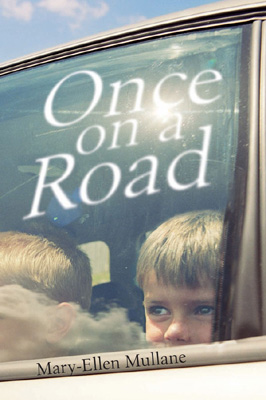Once on a Road Mary Ellen Mullane Interview

Once on a Road
How far would you go to protect your grandchildren from their mother?
Once On A Road goes to the heart of current debate: at what point does a parent lose the right to raise their child? What rights should grandparents have to intervene in the lives of their grandchildren? And how many second chances is a parent allowed?
The novel opens in contemporary Sydney, gripped by drought. Max and Chris, aged eight and ten, are being raised by their paternal grandmother Naomi. Their father died in a car accident eight years previously and their mother, Zoe, implicated in his death, walked out on all of them. Eight years on, Zoe decides to reclaim the care of her children, but it is quickly evident that she can't manage them. What should their grandmother Naomi do?
Topical, astute, heartbreaking, beautifully written and utterly compelling, Once On A Road takes us straight to the heart of an issue that divides the room and stirs fierce debate.
Mary-Ellen Mullane originally worked as a social worker, specialising in child and family health, before moving into film production.
She has won numerous awards as a documentary producer for films and television including Parent Rescue, Divorce Stories, Growing Up and Going Home, Maternity Unit.
She recently completed her Masters of Arts in Creative Writing at Macquarie University.
Once On A Road is her first novel.
Once on a Road
Random House Australia
Author: Mary-Ellen Mullane
Price: $24.95
Interview with Mary-Ellen Mullane
Is this a case of 'write what you know' with your previous profession, a social worker, helping you write Once on a Road?
Mary-Ellen Mullane: Yes, I really agree. I think it is really important to write about what moves you, the things that you feel passionately about, the things you know to be true. As a social worker I specialised in child and family health, I saw people make the most horrendous mistakes and I wanted to write about how those mistakes don't have to mean the end of everything, because we all make mistakes (me included), and we all have a right to be forgiven. One of my first jobs was working with teenagers as a youth worker, and afterwards as a social worker I spent a year working in a neonatal intensive care unit where some babies lived and others died. I then went on to a career as a filmmaker, making documentaries about children and their families. How families solve or don't solve their problems is what moves me to write. I was also inspired by the ancient Biblical story of Naomi and Ruth, a mother-in-law and daughter-in-law whose journey together is almost unique in literature.
How did it feel when Once on a Road, your first book, was finally printed?
Mary-Ellen Mullane: Terrifying and exciting and wonderful all at the same time. It was a bit of a steep learning curve and I wouldn't change any of it for a moment. It has been my lifelong dream to be an author.
There are several issues raised in this book, was this deliberate or did the story and its themes evolve during the writing process?
Mary-Ellen Mullane: I had some idea that I wanted to write about a family and love and duty and forgiveness when I began, but it kept evolving. The themes of exile and return, and love and duty kept getting richer and deeper the more I wrote. I first wrote the book completely from Naomi's point of view and then expanded it to include the voices of the children and finally Zoe. I set out to make this story as real as possible to capture the richness of one particular family's life. The youngest of seven children I learnt to observe people closely at an early age, and so for me it's very important that this story rings true and is intense and inspiring, but above all that the children's voices in it are heard alongside those of the adults.
I created a main character who was a midwife without at first realising what strength that would give to the story thematically. Zoe's character and motivation was a mirror image to Naomi. She was the destroyer, the murderer, the lost soul. This created the sort of tension between the women that I was looking for and threw up lots of impossible problems for them to have to solve.
Is it hard to write such a topical, yet heartbreaking novel?
Mary-Ellen Mullane: It was difficult in parts, but overall, once I knew what it was that I wanted to say, the book wrote itself. The editing was harder; solving plot questions, plausibility, time shifts, voice etc. It was it was very important to me that the book be emotionally true. When I read I want to be taken on a journey, I want to be with a writer who really cares about their characters, and I want to be deeply moved. I wrote the book very much with a reader, just like me, in mind.
What is the best thing about creating a character such as Naomi?
Mary-Ellen Mullane: I set out to create an older woman heroine, really as an exercise, to see if I could do it. She is not your typical heroine - young, beautiful or sexy -and yet, to me, she is very heroic. I also wanted to explore the idea that to be older is to be wiser. I loved creating a strong heroine who was practical and down to earth. She is the centre of the book. She is the sort of woman I would like to be at her age.
MORE



